
Rezi has become a go-to for many job seekers because of its content-focused AI tools, but there’s no one-size-fits-all resume builder - which is why many professionals search for a Rezi alternative.
Some candidates want cleaner templates and more visual control; others want simpler, transparent pricing, resume hosting, or multi-version management for dozens of applications.
Price sensitivity, template variety, AI writing quality, and the overall user experience are the most common drivers that push people to look beyond a single product. In this guide we map the leading alternatives, give honest, practical comparisons against Rezi’s core strengths, and show which platform is a better match depending on your role, industry, and job‑search workflow.
What makes a strong Rezi alternative?
It’s a combination of recruiter‑approved templates, helpful writing features (AI-assisted or high-quality prompts), an intuitive editor, and pricing that’s clear and defensible for the user.
We also value extras that matter day‑to‑day: LinkedIn import, easy resume cloning for multiple tailored applications, a matching cover letter generator, and any hosting or analytics that help you understand how your resume performs. Below we list top contenders, note where they shine, and explain when one is a better fit than another.
We evaluated platforms through the lens of practical job search outcomes: template quality, AI/writing assistance, export flexibility (PDF/DOCX), pricing transparency, and supporting career tools (job trackers, interview prep, portfolio/website builders).
We cross‑checked product pages and pricing, user reviews on Trustpilot/G2/Reddit, and help‑center documentation to verify how features actually work in 2025. For Resumonk specifically we verified current plans and credits from the product pricing page to make sure the comparisons reflect the plans users can sign up for today.
Each platform below takes a slightly different approach to resume creation: some prioritize polished design and portfolio sites, others focus on rapid content generation or deep optimization. We link each product’s official site once (below) and supplement with user‑facing review resources where helpful so you can see what real users report after using the tool.
Resumonk is our own builder and positions itself as an intuitive, privacy‑minded resume creator that balances design and practical features: 20 professional templates, both PDF and DOCX exports, and AI‑powered writing assistance sold via credit packs.
Resumonk also offers LinkedIn import, a “clone” feature to manage multiple tailored resumes, a matching cover letter builder, and hosted unique resume URLs with view analytics - all with transparent pricing and explicit credit usage on the pricing page. Resumonk’s pricing page explains the free tier and AI credit plans (2 months for $29, half‑year for $59) and lists the exact credit costs for AI actions.
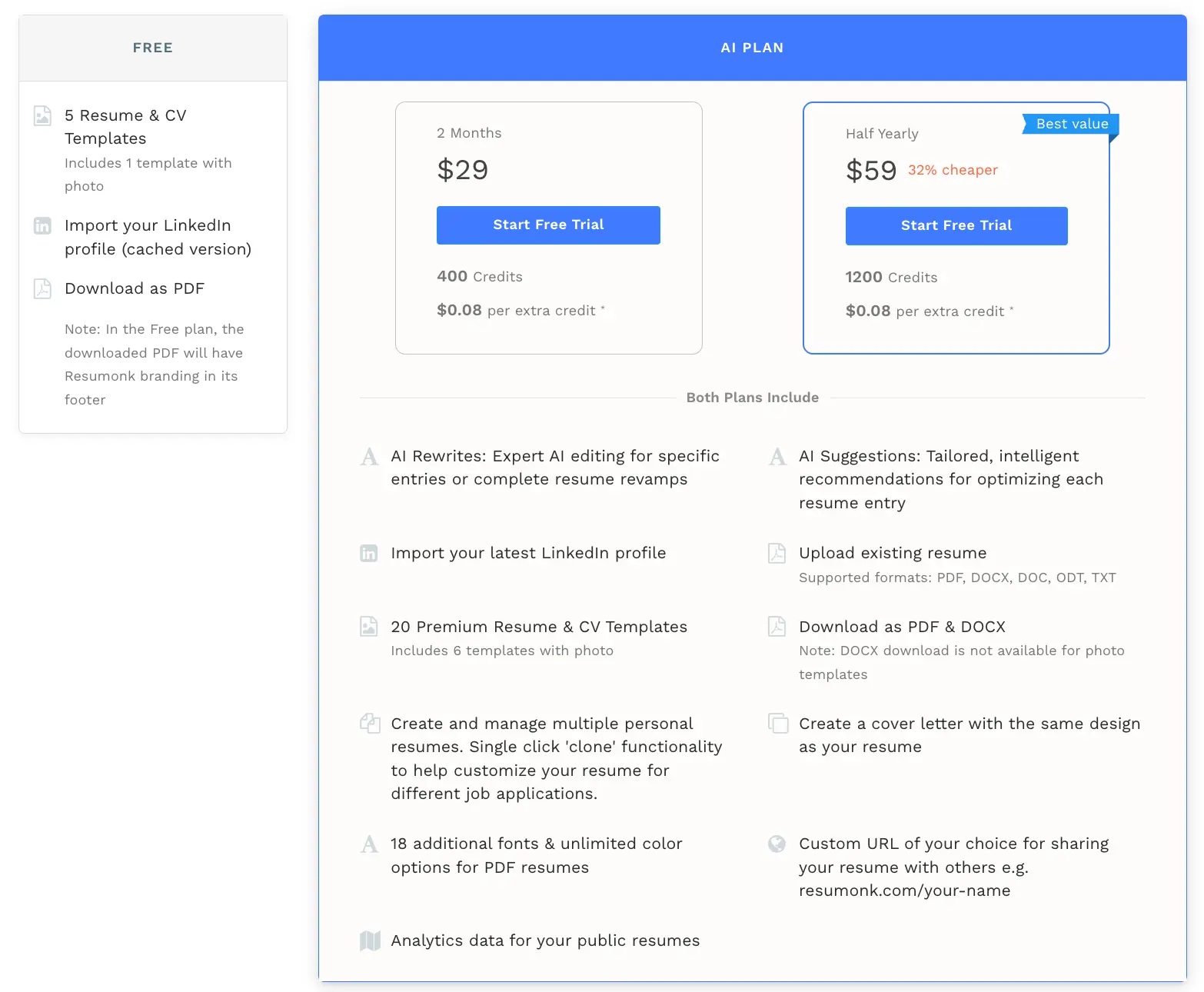
Kickresume is a design- and career-tool hybrid that combines GPT‑4 powered AI writing with a personal website builder and a career map feature.
It’s a solid pick for job seekers who want creative or visually distinct resumes and an integrated site‑style portfolio tied to their resume. The product page lists multiple subscription options and highlights the AI writer, career map, and mobile apps.
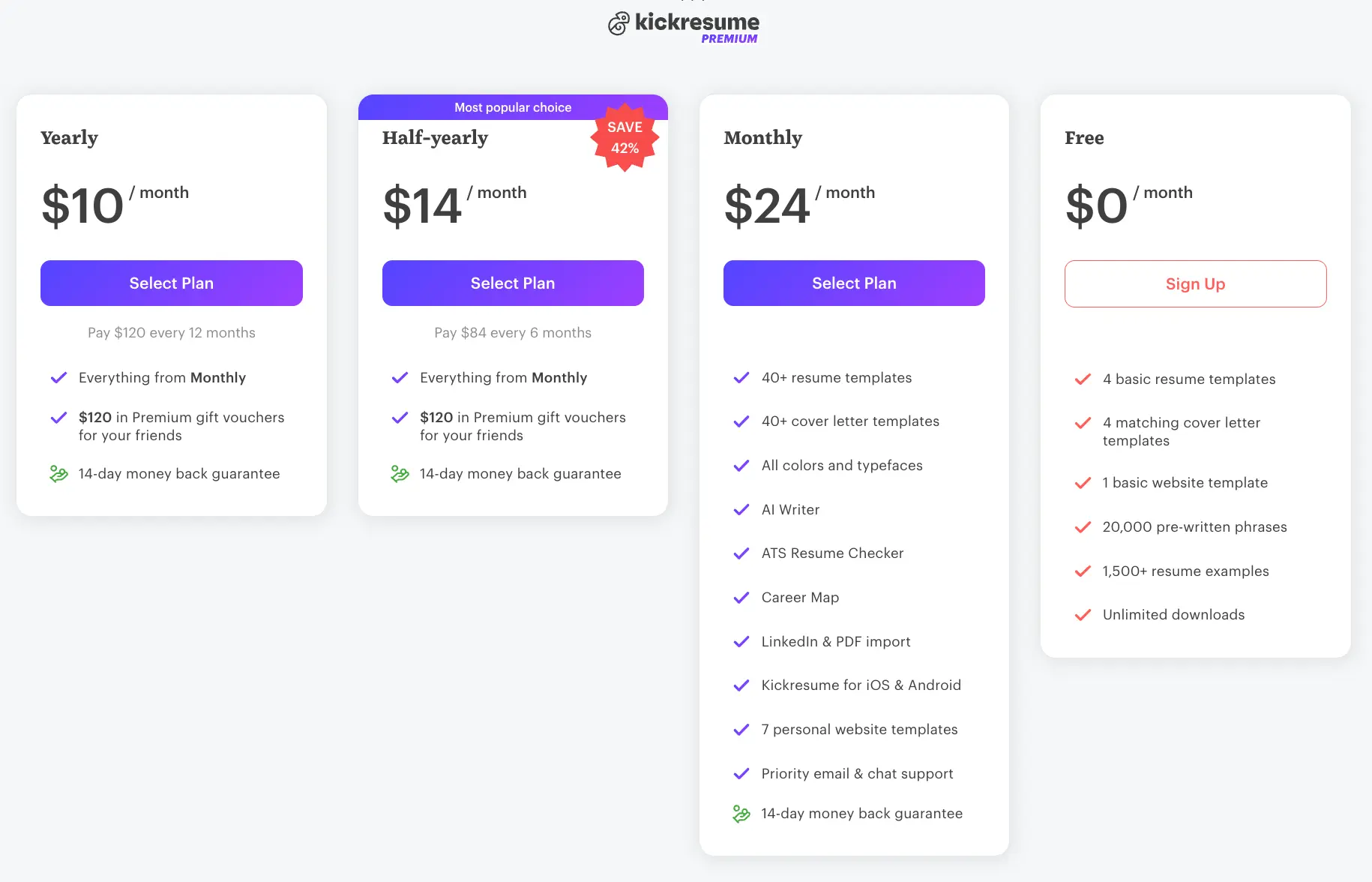
Resume.io is an all‑rounder that combines an AI resume writer, job tracker, interview prep, and a resume score/checker. Their pricing page lists a 7‑day trial (after which subscriptions auto‑renew) plus quarterly and free plans; their builder emphasizes recruiter-tested templates and a job tracker with a Chrome extension to save listings.
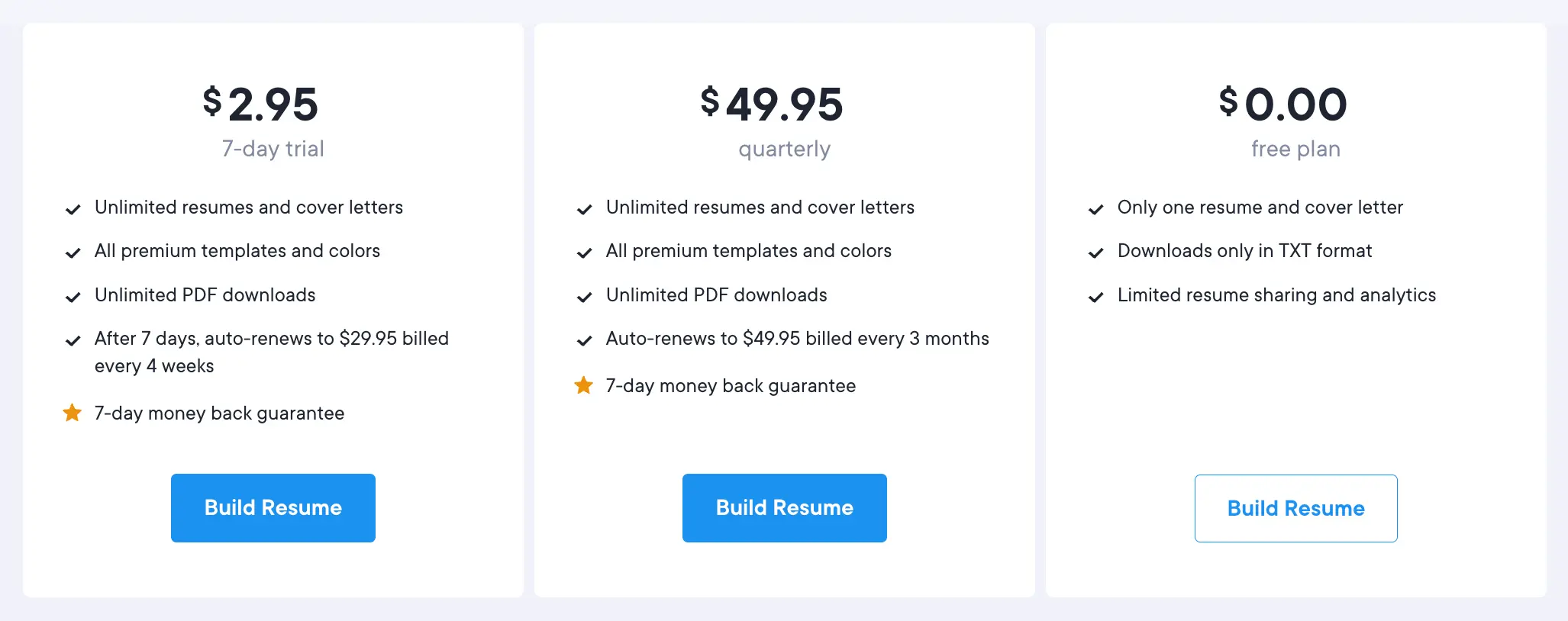
Zety emphasizes guided, step‑by‑step building with 20+ modern templates and pre‑written examples for many roles; they also advertise a “Smart Apply” flow for readability and fast creation. Zety’s pricing includes a short‑trial option and an annual plan; users frequently praise the example text and guided prompts.

Novorésumé focuses on modern visual customization, drag‑and‑drop layout control, and a real‑time preview experience. Their tiered pricing includes monthly, quarterly and annual premium plans with limits on page length and versioning in the free tier - Novorésumé markets itself toward users who need polished, design-forward resumes.
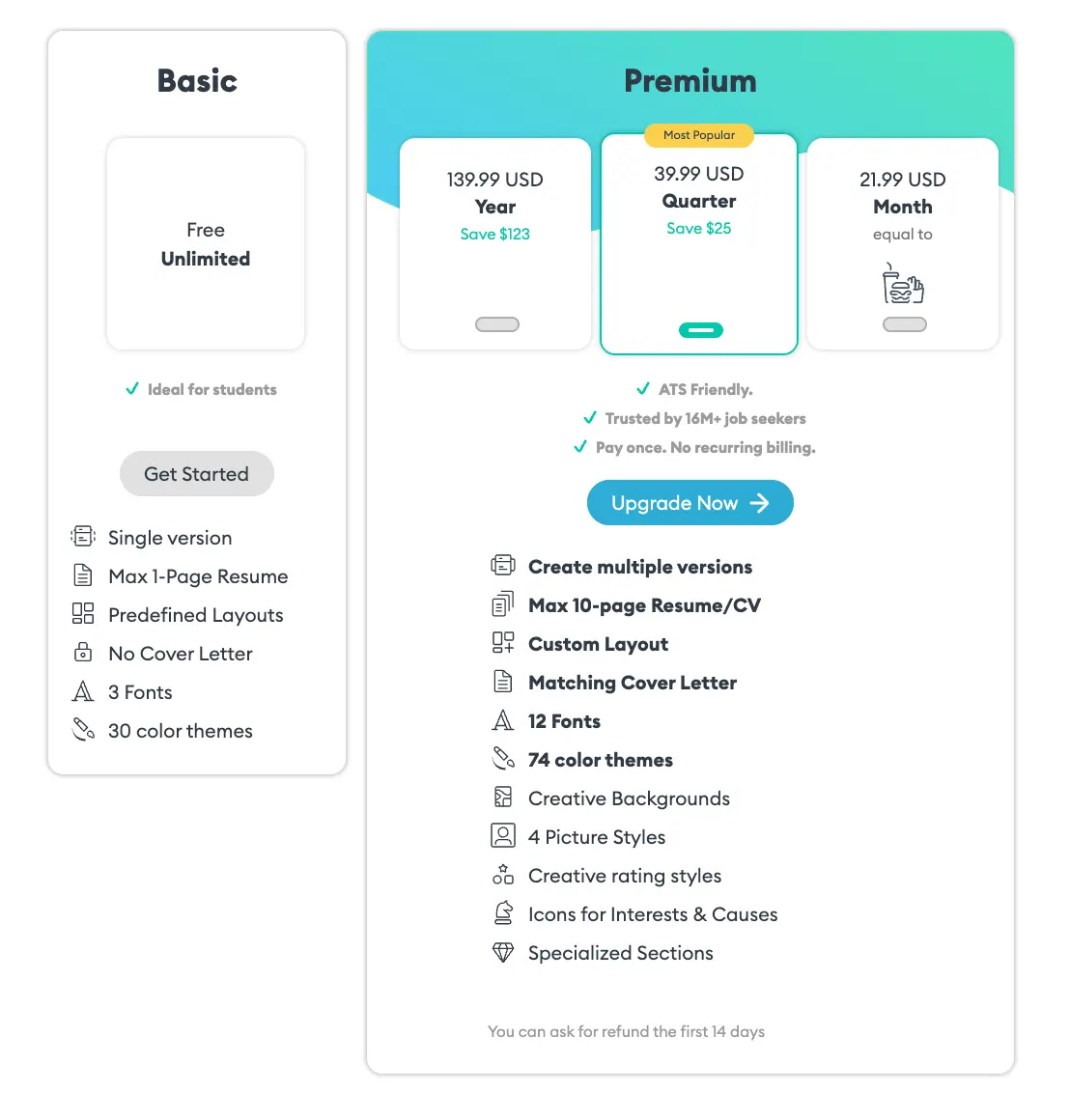
MyPerfectResume pitches a large template library (50+ templates and thousands of design combinations), guided prompts, resume check feedback, and an interview trainer. Their pricing commonly appears as a short low‑cost access period that auto‑renews into a higher periodic fee (the product site outlines the trial and recurring cost structure).
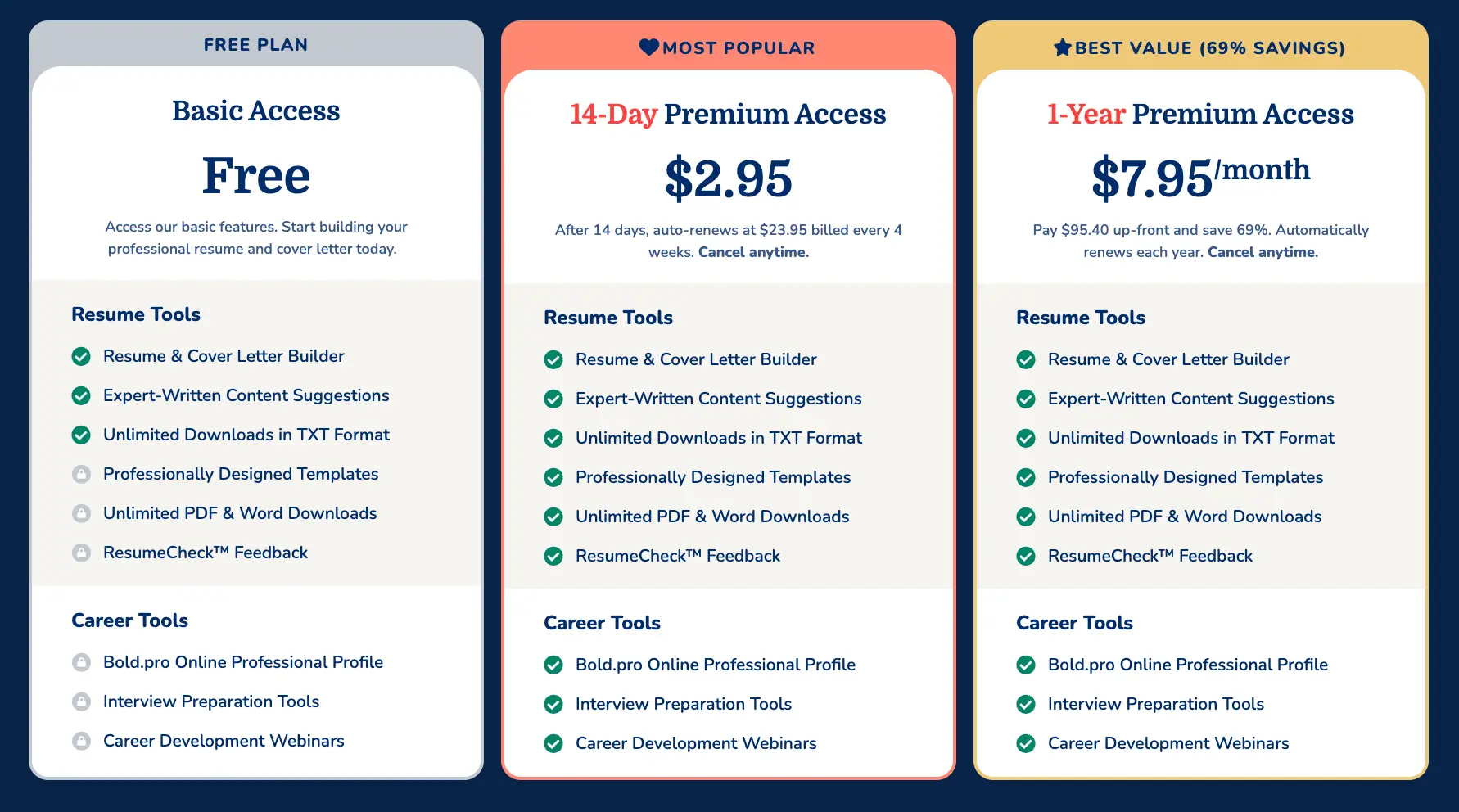
LiveCareer is a long‑standing resume builder with a rich library of industry examples, cover letter tools, and career resources. The site advertises free TXT downloads but places most export and template features behind a paid plan; user discussions on forums highlight both ease of use and occasional billing complaints, so verify trial terms before subscribing.
ResumeGenius focuses on speed and guided content: it offers a quick‑build method using pre‑written phrases and industry templates, plus an AI summary generator and resume checker. Pricing includes a free tier and short low‑cost trials that roll into subscription plans - the site lists a 14‑day trial and annual plans.
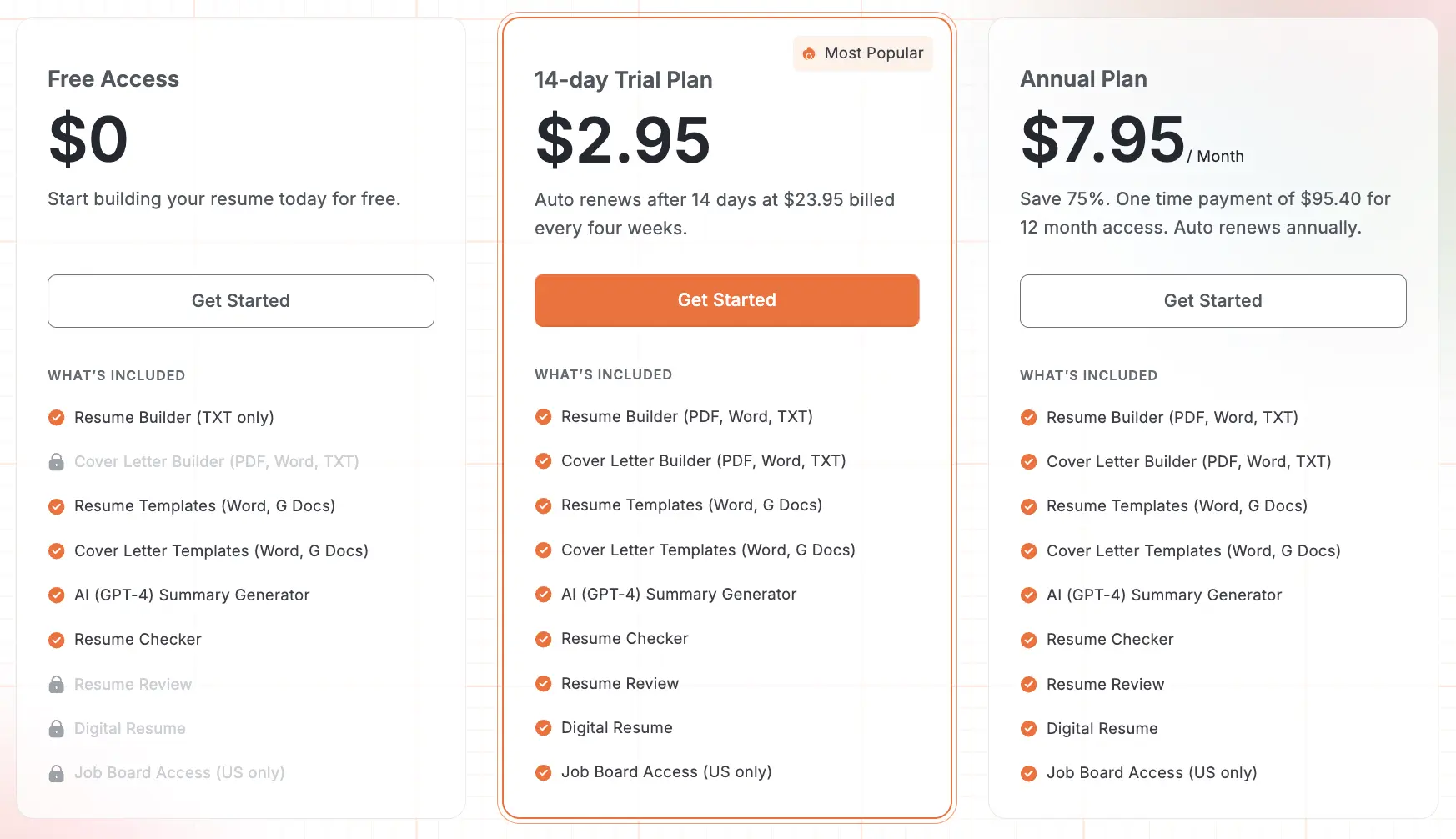
Jobscan is a specialist optimization tool best used alongside a resume builder: it scans resumes against job descriptions and highlights keyword and skills gaps, then suggests edits. Jobscan’s pricing tiers range from limited free scans to premium monthly and quarterly plans with unlimited scans and extra job‑search tools - it’s a match for users who already have a base resume and want deep, actionable optimization.
Teal aims to be an all‑in‑one job search platform combining resume building with application tracking, analytics, and browser extensions. Teal’s premium offering (Teal+) bundles unlimited templates, keyword matching, analysis mode, and resume versioning - it’s ideal for users who want to centralize applications, notes and analytics in one place.
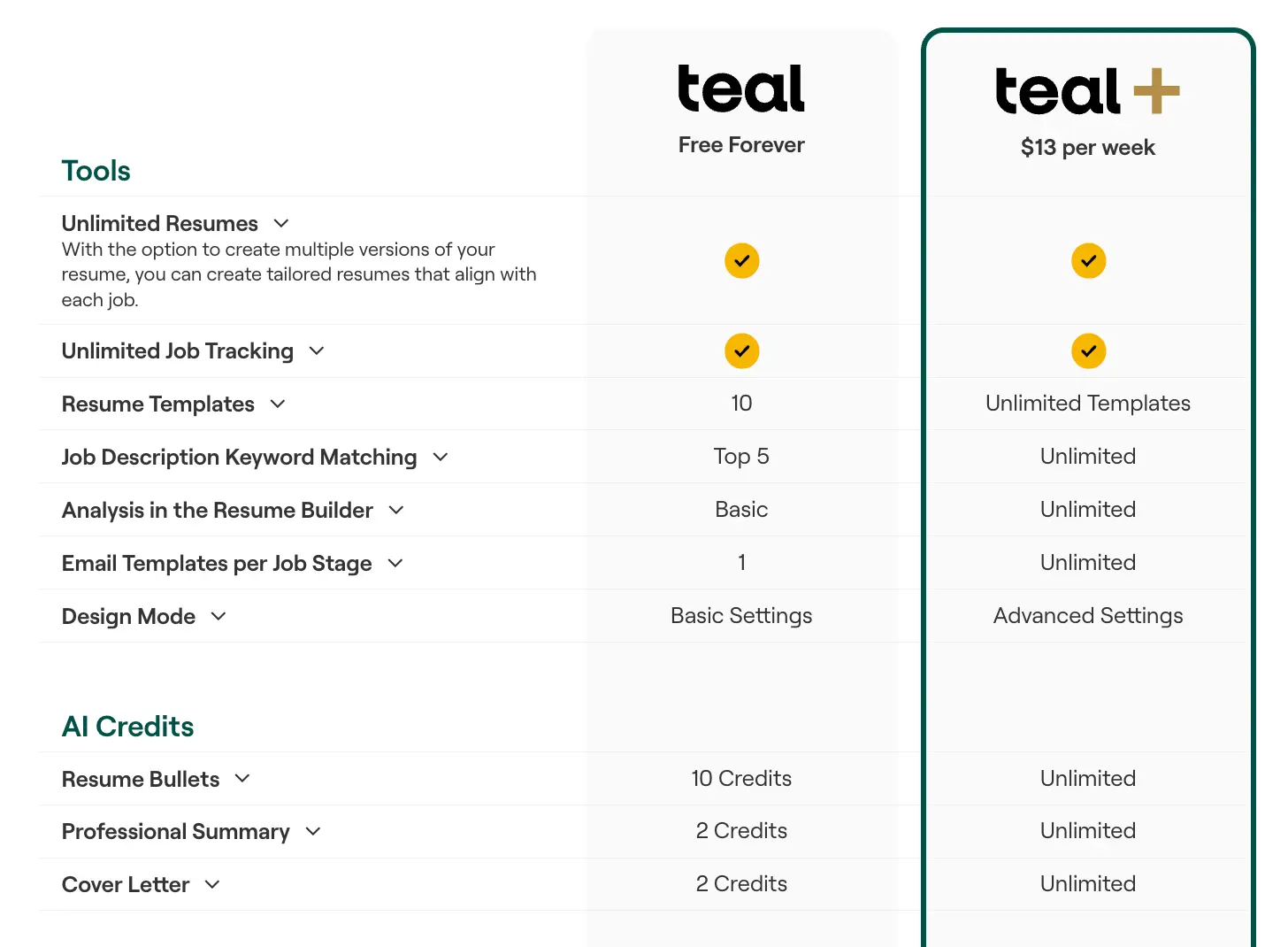
Below we break down side‑by‑side how Resumonk stacks up against Rezi on templates, AI features, pricing and extras so you can decide which approach aligns with your job search strategy.
Resumonk provides 20 modern templates with export to PDF and DOCX (with an exception for certain photo templates); it also exposes 18 additional fonts and an unlimited color palette to let users match personal branding or industry expectations.
Rezi’s template set tends to prioritize single‑column, recruiter‑friendly layouts designed to maximize content readability rather than heavy visual customization. For users who need both DOCX and a hosted, stylable resume, Resumonk’s combination of export flexibility and hosted URL analytics is a differentiator.
Summary: choose Resumonk if you want design control plus hosted analytics; choose Rezi when strict, content‑first, recruiter‑oriented templates and job‑matching are your priority.
Resumonk’s AI toolkit centers on editing and rewrite workflows: "Rewrite with AI" and "Get AI Suggestions" let you improve individual bullets or whole sections, and a full resume rewrite option is included in AI plans.
Rezi concentrates on an AI bullet point generator, AI summary generator, keyword targeting and a Skills Explorer that recommends role‑relevant skills - its product messaging focuses on maximizing job‑match and resume score. If your workflow is to iterate and polish wording across multiple versions, Resumonk’s credited rewrite tools are practical; if you want heavy job‑description optimization and a bullet writer trained for job‑match signals, Rezi specializes there.
Resumonk’s pricing is straightforward: a Free tier with Resumonk branding and limited templates, and AI plans sold as time‑based credit bundles (2 months for $29 with 400 credits; 6 months for $59 with 1,200 credits).
Rezi’s public pricing shows a Free tier, a monthly Pro at $29/month and a one‑time lifetime option around $149 - Rezi markets unlimited AI access on paid tiers with a money‑back guarantee. Compare the per‑use credit model (Resumonk) versus unlimited subscription access (Rezi) to match how often you’ll rely on AI.
Resumonk’s extras include resume cloning for multiple tailored applications, a matching cover letter generator with consistent visual design, and unique URL hosting with analytics to track resume views.
Rezi offers a cover letter writer, resignation letter templates, an AI job search hub, and mock interview practice in its ecosystem - Rezi’s extras skew toward content and job‑search coaching, while Resumonk focuses on document management, design parity and analytics. This distinction matters: if you want to publish and track a single public resume, Resumonk’s hosting + analytics is valuable; if you want iterative optimization and interview practice bundled in, Rezi has that orientation.
The right tool depends on your priorities: budget, design needs, how often you’ll tailor resumes, and whether you want integrated job‑search tracking or deep optimization. Below is a practical, short decision framework to help you pick quickly.
Use this decision checklist to match features to typical job‑search behaviours and goals:
When comparing builders, weigh these essentials: pricing transparency and billing cadence; template count and export formats (PDF/DOCX); AI quality and whether it helps craft content or optimize for job descriptions; extras such as resume hosting, cloning, job tracking, and interview prep; and the editor experience (drag‑and‑drop vs structured forms). A quick decision matrix below maps user priorities to recommended platforms.
We recommend trying free plans or trials first to evaluate the editor and feature set - check how easy it is to export to the formats you need and whether the AI suggestions actually improve your wording.
Also consider long‑term value: if you’ll be applying to many roles, features like resume cloning, hosted links with analytics, or a job tracker can save hours across a search.
Finally, pick the tool that supports your immediate goal (apply now vs. build long‑term career brand) and fits comfortably within your budget and workflow.
There are many credible alternatives to Rezi - each with distinct strengths.
Resumonk focuses on transparent pricing, deep visual customization, and document hosting with analytics; Kickresume and Zety emphasize design and personal brand/website creation; Resume.io and Teal deliver broader job‑search toolkits; while Rezi and Jobscan lead when your priority is job‑specific optimization and keyword matching. The best choice depends on whether your immediate need is design, deep optimization, multi‑application management, or a single, recruiter‑focused resume.
Before you commit, test free tiers and short trials to see how each editor feels in real use.
Look for the export formats you need, confirm the billing cadence and refund policy, and choose the platform that will make your job search faster, clearer, and more repeatable across multiple applications. If you want a balanced mix of design control, hosting, and AI rewriting in a straightforward pricing model, we suggest giving Resumonk a trial as part of your evaluation - and then pick the tool that best aligns to the way you actually apply for jobs.